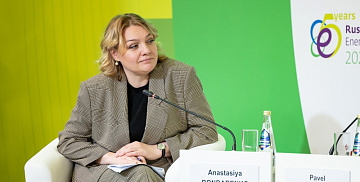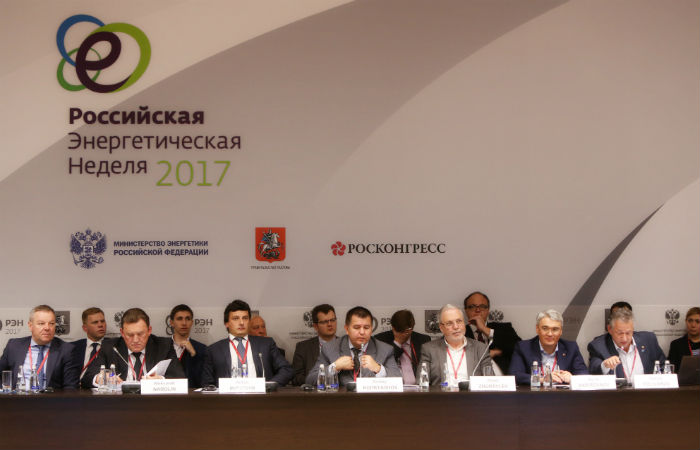State-of-the-Art Technologies: Dialogue with Leaders in the Oil and Gas Sector

KEY
CONCLUSIONS
Gas remains
a popular resource
“The
movement that [...] the energy transition should be accelerated to abandon oil
and gas [...] has been forced upon us […] This was said to be the ultimate
truth […] Banks and investors reacted to this by curtailing investments in the
development of oil and gas [...] This served as the basis for the crisis that
[...] we are seeing in the global energy sector […] We understand that gas is a
very powerful, eco-friendly energy resource [...] The oil and gas era has been
prematurely declared as over,” Gazprom Deputy Chairman of the Management Board
and Director of the Prospective Development Department Oleg Aksyutin said.
“Russia
is a country in which the oil and gas sector plays a huge role. Consequently,
we need to utilize the potential that we have and not follow [the trend of]
technologies that are not profitable for us,” Wormholes Introduction CEO Oleg
Zhuravlev said.
Developing
new fields poses complex technological challenges that Russia is ready to solve
“Gas
reserves in the traditional region are declining, and new production regions
are emerging […] The geological structure and blend composition of the gas
there is different, and the distances and surface infrastructure of the
territory are also different. Based on these challenges, we are setting
technological and technical priorities […] The blend compositions require the
development of processing facilities […] taking into account the specifics of
the deposits of the Far East, the proper development of technologies, and the
ability to monetize these resources as much as possible. New fields and [...]
the state of current fields pose certain challenges, which we are addressing
today as part of work with our industry institutes, the Russian Academy of
Sciences, and companies,” Aksyutin said.
“We
are ready to be a region that [implements projects], including the creation of
testing grounds and the development of technologies and equipment. We believe the
Bazhen federal project is moving forward effectively […] Technologies,
equipment, and approaches are being developed there. Fewer and fewer new unique
large deposits are being discovered around the world. Typically, these are
hard-to-recover reserves [such as] shale oil and gas [...] We consider this trend
to be extremely promising,” Khanty-Mansi Autonomous Area – Yugra Governor Natalya
Komarova said.
Technological
sovereignty in the oil and gas sector is crucial to sustainable development
“The
issue of technological independence is essential and fundamental […] We must
rely on the development of our own technologies and industry […] This involves
systematic work that affects numerous operational layers of any enterprise or
organization, and poses serious challenges. But we won’t be able to do it any
other way. There will probably be an intermediate stage […] when we attract and
use equipment, including from other countries […], but the focus should be on
developing our own, basic domestic equipment,” Aksyutin said.
PROBLEMS
The
‘catch-up’ pace of import substitution
“You
can never play a catch-up role. If the goal of your development is to replace
what you already have, you probably won’t be successful, because the
development cycle is 5–7 years. While you are catching up, those who have been
professionally working on this in the past will be 5–7 years ahead. You will
always be doomed to [...] a catch-up role. We have an objective of replacing
[technologies] here and now, but, at the same time, we have the goal of staying
ahead of the curve,” Member of the Management Board and Managing Director for
Development and Innovation of SIBUR Darya Borisova said.
“In
5–6 years [...] we have doubled our workforce [...] due to new production
facilities […] We are investing a lot and building and now operating [new
facilities]: last year, we launched five new gas processing plants. This year,
we will launch another one, and next year two more, including a polymer plant
[...] Today, more and more skilled professionals are needed,” Irkutsk Oil
Company CEO Yakov Ginzburg said.
The high
cost of reducing carbon emissions
“In
recent years, we have managed to discover significant natural gas reserves […]
We need to take advantage of these resources both for domestic consumption and
for export [...] We need to think about how to reduce emissions into the
atmosphere. We need to create opportunities for capturing and storing carbon
dioxide [...] but the costs associated with this are still very high,” Director
General of Oil and Gas at the Indonesian Ministry of Energy and Mineral
Resources Tutuka Ariadji said.
SOLUTIONS
The
government should promote the development of the tech business
“The
government should promote the development of what we call the tech business […]
State-owned technology companies need to appear that would create new
technologies and sell them on the market [...] If a technology is created, it
needs […] to be sold for a while, and then a large continuous flow of such
technologies will emerge. If a technology is created and introduced one time at
some company and then not sold, it’s a one-time solution [...] The resolve of
companies [...] to create pilot units is crucial […] What’s fundamentally
important here is not just financial support from the state, but also benefits
that would facilitate this process. Because the risks that the company takes on
are very high,” Director of the Topchiev Institute of Petrochemical Synthesis
of the Russian Academy of Sciences Anton Maksimov said.
“The
government provides support when it has a partner who understands the scope of
investment and how he will organize its implementation. Along with the
development of fundamental science, we, as an industrial partner, are preparing
our infrastructure for commercialization [...] An industrial partner must have
a certain degree of maturity and readiness to accept and commercialize
developments, especially advanced developments,” Borisova said.
“Fundamental
science should not develop technologies. It should develop approaches and ideas
[...] The government’s role is to create the need for new technologies among
companies,” Zhuravlev said.
For more information,
visit the Roscongress Foundation’s Information and Analytical System at roscongress.org/en.
The Russian Energy Week
International Forum is a key global platform for discussing current trends in
the development of the modern fuel and energy sector. This event is
traditionally held at the highest level, featuring the participation of leaders
from the largest companies in the energy industry. In 2022, more than 70
events, with the involvement of over 270 speakers, were held as part of REW.
The Forum attracted over 3,000 participants and media representatives from
Russia, as well as 83 foreign countries and territories. The Forum is organized
by the Roscongress Foundation and the Ministry of Energy of the Russian
Federation, with the support of the Moscow City Government.
Official website of REW: rusenergyweek.com. For news about the event and the industry, please
follow the official REW page on VK.





